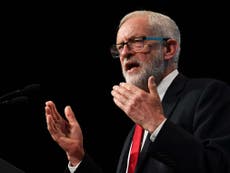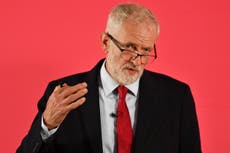Corbyn won't touch Clause IV, but Labour will be wrestling with it forever
Preoccupied with hypothetical referendums and looming elections, the opposition leader is pushing back against grassroots moves to rewrite a key part of the party’s constitution – but those efforts won’t necessarily keep the issue at bay
The Labour Party is often searching for a big idea. All politicians like to show some evidence of wanting “change”, but in Labour – as with other parties of the left – there is often an appetite for a renewed statement of ideological intent. As the world changes, and as party leaderships change, there are different views as to what the party’s core objectives should be. So leaders consider whether they need something new.
Ever since the party’s 1959 election defeat, the statement of aims in its constitution has been the obvious place to go – known simply as “Clause IV”. Hugh Gaitskell pushed to rewrite Clause IV in 1959, and Tony Blair saw it rewritten for a new era when he became leader in 1994. It evidenced change to an electorate still uncertain about Labour’s intentions, and it allowed Blair’s “New” Labour to revise its aims for a very different world.
Now, there is a new grassroots effort underway to get the clause rewritten – but the leadership is having none of it. Instead, there will be a “working group” set up of the party’s National Executive Committee, a process designed to convince Labour conference delegates to withdraw motions advocating a return to the “old” Clause IV and to park the issue altogether.
In fact, ever since the 2015 leadership election, Jeremy Corbyn’s team has repeatedly walked back from rewriting Clause IV. The assumption among Corbyn’s detractors is that any rewrite would hark back to early 20th-century Labour, rather than looking forward to the world as it is today, and that the leadership might simply find doing so too politically sensitive. But the real obstacles to changing the clause long predate the Corbyn era.
In principle, it’s certainly a good exercise for a party to rethink and restate its aims and objectives as the political, economic and social environment changes. But two obstacles always get in the way: the symbolic nature of the current Clause IV, and the question of what on earth you’d replace it with.
For the first decade or so of its life, Labour’s constitution didn’t carry a word about its programme or political objectives. What became known simply as “Clause IV” was agreed in 1918; it didn’t mention socialism, but it did commit the party to “common ownership of the means of production”.
It was open to interpretation, seeking to appeal across what was already a broad church of the British left. But it became a symbol; as the political scientist Henry Drucker said, it held Labour “true to its past, true to what its originators wanted it to be: for labour and against capital”.
But since Clement Attlee’s tenure, leaders have taken their own views on the party’s objectives. Gaitskell believed that a widespread perception of large-scale nationalisation had lost the party votes. Today, his proposed revisions would mark a radical socialist departure, not a moderating effort – but he lost his battle nonetheless. Harold Wilson subsequently called Gaitskell’s failed move an attempt to “take Genesis out of the Bible”; he ignored Clause IV altogether, and set out his own “white heat” socialist programme through speeches instead.
The subject came up again in Neil Kinnock’s time, but he decided against any clarification. So too did John Smith. The question was often: “Why fight this now?”
The same question will be asked within Corbyn’s team, as Blair’s change to Clause IV has taken on its own symbolism – the moment when Labour “modernised” and won.
But once again, the problem is what the replacement statement would look like. Blair’s commitment to rewrite Clause IV was made with little idea of what to replace it with. In the end, the rewritten text was very clear about what Labour wasn’t – a party of nationalisation – and with Labour in the ascendant for the first time in decades, that was enough.
During the 2015 Labour leadership contest, Yvette Cooper suggested reworking it again to include clearer statements about tackling inequality. But Corbyn’s team elected instead to make their most powerful statement of intent with the 2017 manifesto. While it failed to win Corbyn an election, it is widely perceived within Labour as having helped him defy expectations.
Since then, and as Ed Miliband tweeted recently, Labour’s “too well-hidden secret” is an economic agenda that unites different Labour figures and is far more critical of the status quo than any it has advanced in recent decades.
One obvious way to make it less hidden would be a high-profile debate about the party’s core objectives, and a commitment to bring them up to date. But preoccupied with hypothetical referendums and looming elections, both of which are exacerbating Labour’s bitter divisions, Corbyn seems keen to avoid meddling with the party’s core statements of intent.
Politically speaking, that’s understandable. But the lesson from former Labour leaders is that – whatever Corbyn wants – this will never go away.
Dr Karl Pike teaches and researches in the school of politics and international relations at Queen Mary, University of London





Join our commenting forum
Join thought-provoking conversations, follow other Independent readers and see their replies